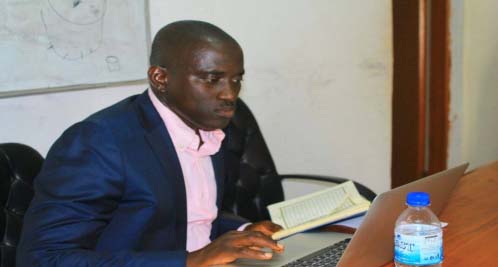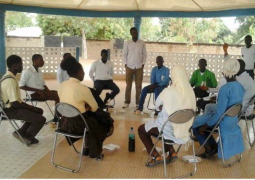
I greet you all: members of the Sarahulleh Youth Development Organisation (SYDO), Ankiraa jamm? Indeed it was a great honour and pleasure to speak to you this past Sunday on the Quran. For once the whole of Badibou can be proud that a whole community of Sarahullehs gathered to listen to a son of the place they mockingly call suloo banku (home of the wolves). You asked me to write about the lecture and indeed that is an onerous challenge; as you know we the Badibunkas have one flaw in common with Sarahullehs, we do not like to do things free. Anyway let me start with this write-up and if you would send me some batik or sombi as payment, I will continue with a full book.
I have for longed been a keen student of the Holy Quran but of late, that love of the Book of Allah has evolved into a magnificent obsession. My journey through/with the Quran is a long and winding one but let me explain a little bit of it for now with a view to convey a message that beyond the recitation and memorization of the Book of Allah, we can and should embark on a major paradigm shift to actually live the Book and not just read it. Indeed I am not an expert on Quran, but I have since made it my calling to learn and teach Its practical application in the daily lives of young people. That is my new job and to this cause I intend to dedicate the rest of my life with due humility and sincere approach hoping Allah will accept this humble offer from His sinful servant.
Maaremmu,
Surah Furqaan has for long been one of my favourite Surahs, its literary exquisiteness, the rhyme scheme among other qualities bring it closest to the one I think is my number favourite, Surah Mariam. Well its tough to draw comparisons between different Surah’s of the Quran as Ustass Abdurahman Sowe once told a friend who kept changing which Surah is her favourite. The erudite Ustass kept her at peace by advising her to just simply enjoy the scripture because every time she approaches this Great Book with sincere humility and earnest hope, she is going to discover something new. Then he concluded by telling my friend that the Quran is just like a cube of sugar (sukuri donja, in Wolof); any corner that you bite is equally sweet—and to that, I say Allaahu Akbarr!
Sorry for the digression my good friends but my journey with the Quran has been a most exciting one for the past 20 years of my adult-life. In Jangi Jollof, I described my trip from home to Kairaba Hotel where I was to give the valedictory speech during The Gambia’s first ever graduation of home-trained university student. This is the narration from pages 67-68 of the approved schools edition: “During the journey to Kairaba Hotel, I spoke very little. I opened the Quran to recite a Surah I had become accustomed to reciting due to its poetic beauty and theme – full of Allah’s miracles and mercy. “Kahf Ha Ya Ain Saad” I read the first verse (in Arabic). If you are familiar with the Quran, you would have known that the Surah is Mariam.”
So you will realize that Surah Mariam is close to my heart and then you can understand how much I love Surah Furqaan when I bring it shoulder-to-shoulder with Mariam. Anyway to hit the point, there is a verse in Surah Furqaan whose practical application will bring you a lot of peace and calm. And if we as Muslim would implement this one Ayat in our lives, we would live in peace in our homes, schools, towns and cities forever. Here’s the quote from verse 63 of Surah Furqaan “Wa ibadu arrahmaniallatheena yamshoona AAala-l-ardi hawnanwa-itha khatabahumu aljahiloona qaloosalama” (And the servants of the Most Merciful are those who walk upon the earth easily, and when the ignorant address them [harshly], they say [words of] peace,)
Now the point is that I have been reading this Surah for ages but never woke up to the practical importance of this verse until I saw a very apt tafsir of it on YouTube a few weeks ago. I wish I had viewed this ayat from its practical angle because it would have saved me a lot of trouble, anger and resentment. You see this urge to get even with people is the scourge of our lives. In our homes, schools, work places, if we could just practice this ayat, our lives would be ennobled and life would shine with a glitter of peace and tranquility. And just a reminder, my good friends, the patience that is enjoined on us here is not the one where you would scoff at the person whilst turning away from him with contempt. The idea being taught here is further conveyed elsewhere in the Quran when Allah said “fasbirr sabran jameelaa”, meaning (So be thou Patient with an elegant patience.). This kind of patience requires the nobility of forbearance with a dignified approach.
Truly patience is not an easy virtue because it surely can hurt you. But if you do it for the sake of Allah then it will become easier; in that case you will always remember the words of Allah “INNALLAHA MA ASSABIREEN” ( Verily Allah is with those who are patient); and as he said it elsewhere in Surah Baqara “wa bashiris sabireen” (give glad tidings to those who are patient). Truly Allah does not fail in His promises as He repeats in several sections of the Quran. The adage is true “patience may hurt you, but it is still a virtue!”
Maaremmu, if you are searching for the keys to success, please do not waste your time with authors like the Badibunka boy who wrote “Instant Success”; after all even the Sarahullehs could write better books than that with their practical experience from Angola to Sierra Leone. Now let me give you a key to success that is more authentic and lasting. There is a Surah in the Quran that you read everyday and in it is a pair of verses that if you would embrace and practice in your life, you would not only be successful in this world but you would be successful in the hereafter as well. But lest you be disappointed, let me make it clear that the formula I am about to give you has nothing to do with the repetition of words around strange numbers that must be odd or prime. No, am talking about words that you would not only mouth but reflect upon and practice on a daily basis; in other words; this formula is one that will make you to walk the talk. And here it is: qad aflaha man tazakkaa Wathakara isma rabbihi fasalla (He has certainly succeeded who purifies himself And glorifies the name of his Guardian-Lord, and prays.). Sure the pair are the 14th and 15th verses of Surah Al A’la that you recite daily in your optional salat.
Maaremmu, I guess the above two verses are pretty clear. To purify yourself; to free yourself of shirk and the practice of prohibited things and then to constantly remember Allah is the key to success; and by success I mean success in both this world and the hereafter. Surely it will take a full book or books to fully explain this concept and I will work on that soonest. But for now let me dilate on salat for it does purify you if done properly and in salat is the best remembrance of Allah.
Let me share with you a conversation I once had with the most scholarly Mr. Ousainou Jallow who drew my attention to the Muslim call to prayer Azaan, saying “think of this and what must have let the Prophet of Islam to come up with such inspiring verse.” That prompting was certainly food for thought as my mind raced through the verses/words that make up the Azaan. The motivational author in me would settle, and ruminate on the part that says “hayya allasalaat, hayya allal falaah” (come to prayer, come to success). In this alone lies the key to success in both this world and the hereafter. Here is motivational literature and motivational pep talk available to Muslims at the very least ten times a day; counting both the Azaan and the Iqaama that use the same verse.
Now let us start with salat and its benefits for success not only in the hereafter but also in the here and now. The Quran tells us in Surah Al Ankabut, “waaqimi assalata inna assalatatanha AAani alfahsha-i walmunkari…” (and establish regular Prayer: for Prayer restrains from shameful and unjust deeds ;) and this is great wisdom for the protection of the soul and the purification of yourself. During salat, when we sit down “In tashah’hud position, our hip, elbow, knee joints, backbone, wrist joints move in a way that it provides a form of relaxation to our entire body. Pressure is applied on the body parts as if it was a kind of massage which releases tension” wrote the website alislam.org. The same website goes on to say “The most important function in salat is sajdah where we touch the ground with our forehead. This posture increases fresh supply of blood to our brain. Needless to say in certain forms of yoga some adherents stand on their heads for the same purpose.” So salat can help maintain and boost not only your spirit but your health. If you Sarahullehs think health is nothing, then I can motivate you by quoting the age-old maxim: Health is Weath!
And how can I write about salat without drawing inspiration from my learned sheikh Omar Bun Jeng of blessed memory. He was speaking with his immutable passion when he asked the rhetorical question: is the Islamic religion about praying in a mosque alone? Are we going to tie Islam and confine it in a mosque restraining its potential to transform our lives? Or are we going to let it reign free in our lives; shaping our habits and behaviour and let it regulate our affairs in our daily life? Food for thought indeed for as motivational author and speaker Tony Robins would put it “questions are the answer!” Answer the foregoing questions of Omar Bun Jeng and let the message stand! You will surely be on cruise control to Success, Insha Allah!
Maaremmu,
In parting let me inform you all that later this month I will officially inaugurate my bookstore on Kairaba Avenue, “Jangi Jollof, All Books Gambian”, an institution set up to market and promote Gambian art; since March is the month set out for the celebration of books, I will mark the inauguration of this enterprise with a public lecture on the Quran as the greatest of all books. All Sarahullehs are invited but to note that the language of instruction shall be the Queen’s tongue. So please my Sarahulleh friends, those of you who cannot speak English can rush to my uncle Alhaji Basiru Jawara for a crash course in that language. And by the way, for some special personal reason, I am extending a special invitation to the Tunkara family who used to be our neighbours at Perseverance Street in Banjul.
Until then, Assalaamu alaikum wa Rahmatullah.
Momodou Sabally
The Gambia’s Pen
Father of the Sarahullehs
Read Other Articles In Article (Archive)




